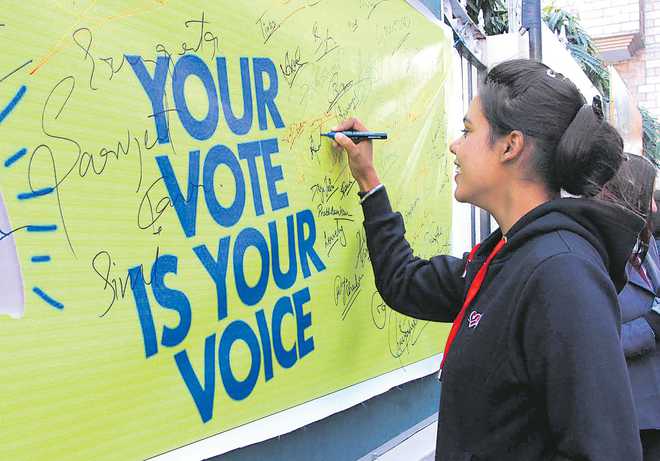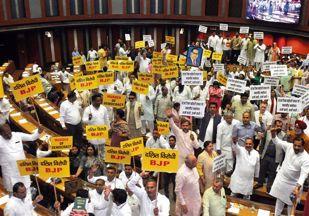
RAISE YOUR VOICE: A signature campaign for young voters in Jalandhar
Jagdeep S. Chhokar
IT is not often that a newspaper writes both editorials on the same issue. The Tribune did that on April 11. (“Low turnout in Srinagar”, and “Vote buying”). Why would this happen?
Take a look at the following headlines: "Eight killed in Kashmir bypoll violence, Srinagar registers poor voter turnout of 7.14 per cent"; "EC cancels RK Nagar bypoll, cites voter bribery, corruption"; "After 7 per cent and 8 deaths, Anantnag bypoll is deferred". All these headlines pertain to elections and have appeared in major English dailies over the last couple of days.
There are more headlines in the same mode: "Sixteen parties urge EC to use paper ballots", citing "too deep and pervasive…trust deficit." And: "Shiv Sena MP Ravindra Gaikwad attacks Air India staffer with slippers;" and "Government pressure forced Air India to withdraw Ravindra Gaikwad's flying ban." "BJP MLA threatens to behead those who try to stop Ram mandir construction." Finally, "Behead Bengal CM Mamata Banerjee, get Rs 11-lakh: BJP youth leader."
To top it all, "Circumventing the Rajya Sabha" which, inter alia, said, "The Chairman of the Rajya Sabha, Vice President Hamid Ansari and the Deputy Chairman, P.J. Kurien, reportedly expressed their concern recently on attempts being made to whittle away the legislative powers of the Rajya Sabha and make it a redundant legislative House."
What does all of the above say about the state of democracy in India? If we rephrase the above, all of it can be summarised as the following:
- The electoral process, the bedrock of democracy, is becoming more and more fragile.
- Parliament and its functioning are under a cloud, there seems to be a view that there is a deliberate attempt to undermine it.
- Lawlessness seems to be on the increase, as evidenced by open and direct threats of violence. "Rule of law" never too strong, seems to be becoming weaker by the day.
There is, of course, a contrasting view which says that things are getting better, the country is on its way to fulfilling the ever-rising aspirations of people, and becoming great again. It is, however, hard to believe this alternate narrative when one is told that "anonymity" and "transparency" are mutually reinforcing concepts! On attaining Independence from colonial rule, India was designed to be a constitutional democracy. It may not be out of place to remember what the man who is sometimes referred to as the primary author of the Indian Constitution, B.R. Ambedkar, and whose birth anniversary the nation celebrated with great fanfare, going by the big advertisements in all newspaper, on April 14, felt like telling the nation 68 years ago. After making a substantial part of his speech, he said, “Here I could have ended. But my mind is so full of the future of our country that I feel I ought to take this occasion to give expression to some of my reflections thereon.” And then he went on to say some words of caution which today sound prophetic. This was the day the Constitution was adopted, November 25, 1949. Some of what he said is reproduced below:
“I feel, however good a Constitution may be, it is sure to turn out bad because those who are called to work it, happen to be a bad lot. However bad a Constitution may be, it may turn out to be good if those who are called to work it, happen to be a good lot. The working of a Constitution does not depend wholly upon the nature of the Constitution. The Constitution can provide only the organs of State such as the Legislature, the Executive and the Judiciary. The factors on which the working of those organs of the State depend are the people and the political parties they will set up as their instruments to carry out their wishes and their politics”. (Italics added).
"On January 26, 1950, India will be an independent country. What would happen to her independence? Will she maintain her independence or will she lose it again? This is the first thought that comes to my mind. It is not that India was never an independent country. The point is that she once lost the independence she had. Will she lose it a second time? It is this thought which makes me most anxious for the future. What perturbs me greatly is the fact that not only India has once before lost her independence, but she lost it by the infidelity and treachery of some of her own people.”
“Will history repeat itself? It is this thought which fills me with anxiety. This anxiety is deepened by the realisation of the fact that in addition to our old enemies in the form of castes and creeds we are going to have many political parties with diverse and opposing political creeds. Will Indians place the country above their creed or will they place creed above country? I do not know. But this much is certain that if the parties place creed above country, our independence will be put in jeopardy a second time and probably be lost for ever. This eventuality we must all resolutely guard against. We must be determined to defend our independence with the last drop of our blood.”
“It is not that India did not know what is democracy. There was a time when India was studded with republics, and even where there were monarchies, they were either elected or limited. They were never absolute.”
"The second thing we must do is to observe the caution which John Stuart Mill has given to all who are interested in the maintenance of democracy, namely, not ‘to lay their liberties at the feet of even a great man, or to trust him with power which enables him to subvert their institutions’. There is nothing wrong in being grateful to great men who have rendered life-long services to the country. There are limits to gratefulness. As has been said by the Irish Patriot Daniel O'Connel, no man can be grateful at the cost of his honour, no woman can be grateful at the cost of her chastity and no nation can be grateful at the cost of its liberty. This caution is far more necessary in the case of India than in the case of any other country. For in India, Bhakti or what may be called the path of devotion or hero-worship, plays a part in its politics unequalled in magnitude by the part it plays in the politics of any other country in the world. Bhakti in religion may be a road to the salvation of the soul. But in politics, Bhakti or hero-worship is a sure road to degradation and to eventual dictatorship.”
Ambedkar's prescience is either uncanny and scary, or it reflects a very deep understanding of the Indian mind-set. But whatever it is, the state of democracy in India is perilous. Yes, the final responsibility does rest with the people, and "We, the People", have allowed political parties to “place creed above country” and thus put “our independence … in jeopardy a second time (making the possibility of losing it) for ever” very real. Are we willing “to defend our independence with the last drop of our blood”? It is for each one of us to answer.
The writer is a former Professor, Dean & Director in charge of the IIM, Ahmedabad.



























